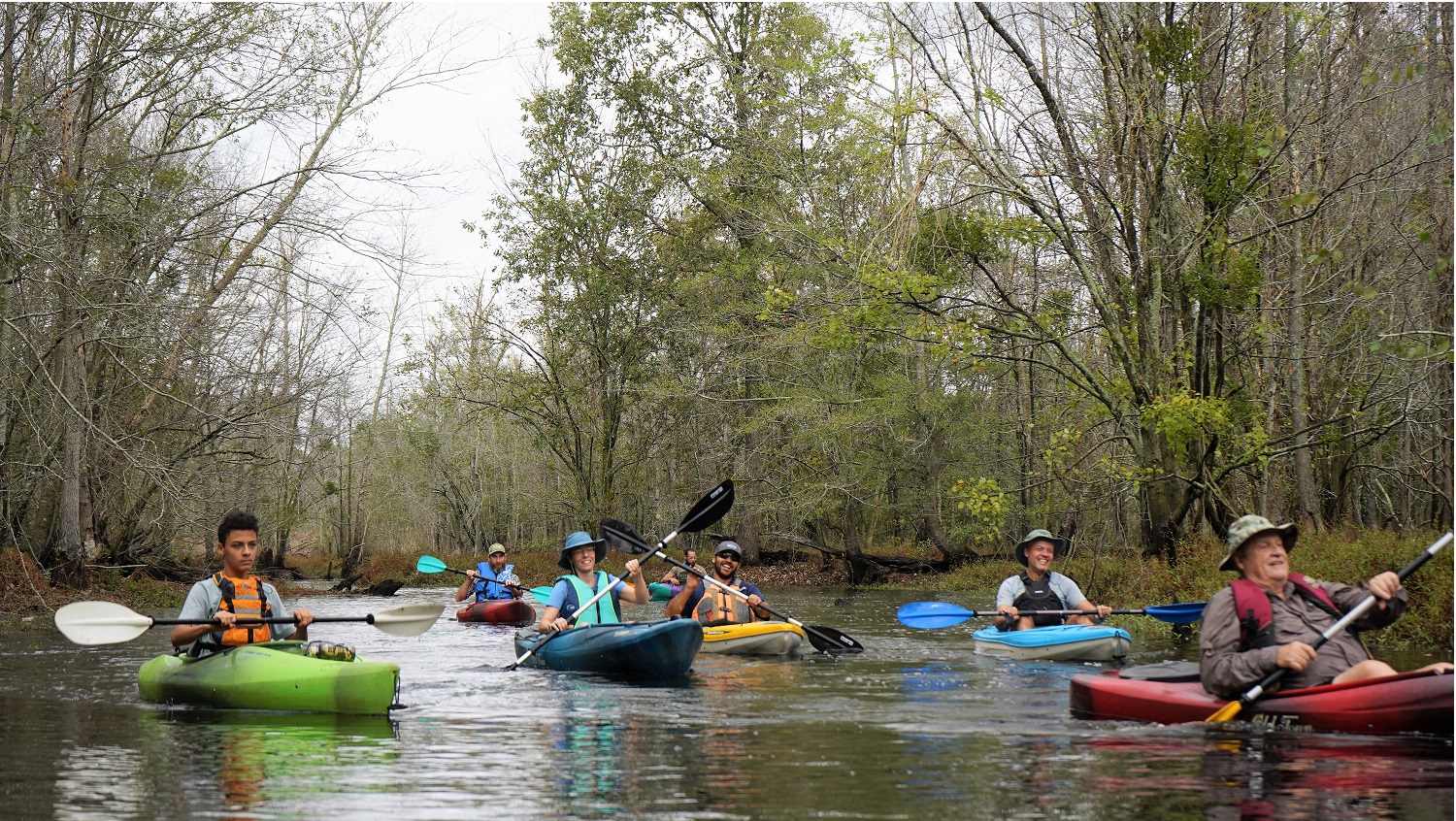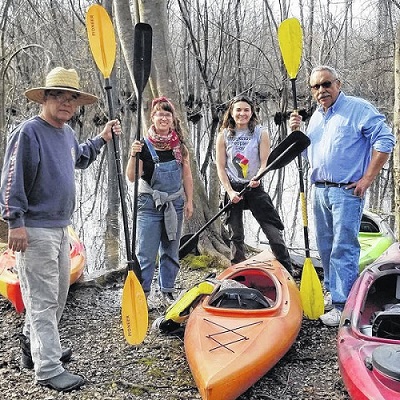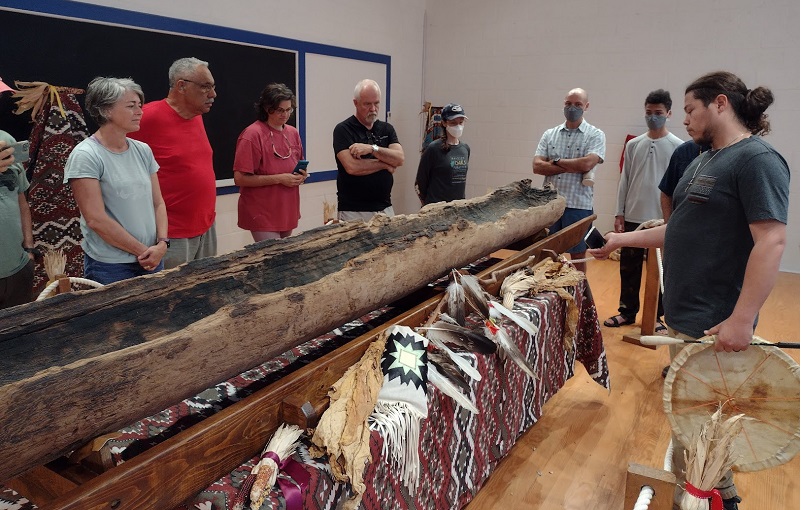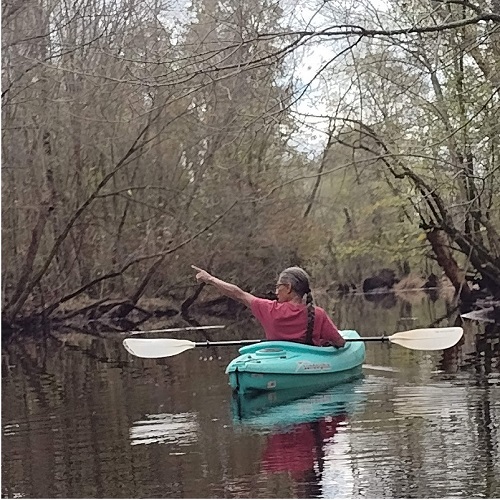Paddling with the Coharie Tribe: A People-First Tourism Experience

One part tourism research lab and one part business, People-First Tourism (P1tLab) is a social start-up created via professors at NC State. It is both a movement and a company that supports communities that want to develop tourism from within and based on their local people, talent, stories and culture.
P1tLab started working with the Coharie Tribe in Sampson County, NC five years ago after an invitation by Ryan Emanuel, former FER professor and now a professor at Duke. P1tLab members paddled the river with Coharie tribe members, listened to their desire to begin offering tourism trips, organized a few paid trips with them before the pandemic, and organized two virtual tours of their cultural center and the river during the pandemic.
“The mission of our company is to enable communities to harness the economic power of tourism on their terms,” says Duarte Morais, co-founder of P1tLab and associate professor in NC State’s department of parks, recreation and tourism management, “and to allow tourists to connect more deeply with the people and places they visit.”
To promote the Coharie’s deep love and stewardship of their river, P1tLab created We Are the River, a video designed to convey what the river meant and means to the Coharie Tribe. The lab also mentored the tribe through a phase of “tourism microentrepreneurial development” by meeting with Greg Jacobs, tribal administrator to discuss potential revenue streams and working with Phillip Bell, the coordinator of the tribe’s river stewardship program to learn which sections of the river tourists prefer to paddle, their typical paddling skill and physical level, as well as the sections that remain free of fallen trees and other dangers.

of the Great Coharie River (Credit: The Sampson Independent)
Restoring the Great Coharie River
“One tree at a time, one step forward and three steps back,” is how Greg Jacobs describes the experience that he and Phillip Bell have shared since they made a commitment to clear and clean a river once cherished by the Coharie people.
Once a calm place to relax, a fun place to swim and a significant source of subsistence, the Great Coharie River was the heart of a resilient and close community of Native Americans.
Storms of the 1990’s were devastating to the River’s water flow, leaving fallen trees and debris throughout. It became a swamp entangled with beaver dams such that one couldn’t walk to the edge of the river bank anymore. The once secure, running stream surrounded by shading trees became distant and evaporated from the everyday life of the community.
Attempts to obtain help to restore the river lead nowhere and the work that needed to be done seemed too huge for the tribe’s abilities. Almost 20 year past before tribal elders implored their leaders to bring reclaim and love the Great Coharie River.
The river couldn’t take care of itself, so it got us to take care of it.” says Phillip Bell.
In preparation for offering river tours to the public, P1tLab connected tribe member Kullen Bell with the owner of Froghollow Outdoors to share best practices associated with paddling and guided river trips. Dylan Dodson, a current graduate student conducting research with P1tLab, travelled to the Coharie Tribal Center in Clinton, NC twice to provide assistance with website development. Dodson is also a central regional field director for the Office of Governor Roy Cooper.
Paddle tours offered by the Coharie Tribe include a visit to the Coharie Tribal Center, formally called the East Carolina Indian School in 1943. Once a high school for tribal members that also serviced Native American students from several surrounding counties, the original building now serves as the current Coharie Tribal Administrative Offices where visitors can see a 600-year old canoe, tour the community garden and museum and purchase sorghum syrup. The tribe also welcomes all to attend a Coharie Powwow at the center to hear drumming, see dance performances and sample American Indian foods.
The Coharie Canoe: A Precious Artifact
In 2018, a burned-out canoe was discovered in the South River near Autryville, NC. Using carbon-dating, state archaeologists believe the canoe was built somewhere around 1470, before documented history in the area where it was discovered began. The canoe underwent preservation treatment at the Underwater Archaeology Lab at Fort Fisher before ultimately being brought to the tribal center in Sampson county.

“Custody and display of the canoe is paramount in the eyes and hearts of the Coharie people,” said Philip Bell. “This canoe represents another relic of the past validating existence of Native American residents who, following colonization, immigration and encumbered trials, have weathered the test of time. This canoe is important to sharing the story of the Coharie people’s past, culture and resilience. Possession of a prestigious historical object like this canoe that points back to one’s heritage is a significant find for elders of the tribe and a great teaching tool for generations to come.”
In 2019, the Great Coharie River Initiative was awarded a Duke Energy grant to assist in restoration efforts to create more navigable pathways through the upper section of the river. The Coharie Tribe also received the Water Conservationist of the Year Award for the all-volunteer effort to clear 20 miles of public access to the Coharie River, the first time the prestigious conservation award has gone to a Native American tribe.
Descendants from the Aboriginal Neusiok Indians
The Coharies descend from the aboriginal tribe of the Neusiok Indians. The name Neusiok is connected with that of the Neuse River and these Indians primarily lived on the lower Neuse River particularly on the south side, in Craven and Carteret Counties of present-day North Carolina.
Today, the Coharie Indian Tribe with a tribal roll of more than 3,000 members, is located in the southeastern region of North Carolina in the counties of Harnett and Sampson. Historical movements, initiated by Inter-Tribal as well as White/Indian colonial hostilities, caused the Coharies to move to their present location between 1729 and 1746. Since this date, they have lived continuously as an Indian Tribe at or around the Little Coharie River.

one of the many Cypress trees that line the Great Coharie River. (C.Lewis)
According to legend, when Coharie mothers heard strangers approaching their village, they gathered their children and softly whispered, “Shhh,” to quiet them until the strangers passed. Tribe members say you can hear the same sound today as the wind blows through the whispering pines.
“I hear the river say I know your ancestors that you didn’t know. I was here for them then and I’m here for you.” – Greg Jacobs, Coharie Tribal Administrator.
The Great Coharie River spans about 43.5 miles. Phillip Bell would like to see the entire area clear, so that someone could easily go from Sampson County to the coast via the water. Members of P1tLab share the tribe’s vision and believe local tourism experiences could make it a reality.
As a culmination of P1tLab’s long-term engagement with the Coharie, PBS produced a feature on the Great Coharie River on North Carolina Weekend: Bucket List Ideas that aired in October 2022. Beginning at the 14.11 minute mark, the show features Greg Jacobs, Philip Bell and other members of the Coharie Tribe.